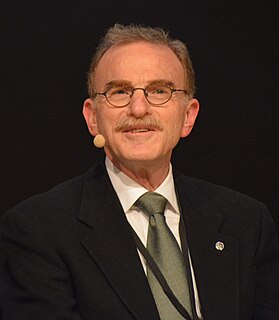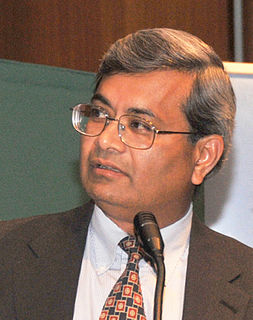Related Research Articles

In cell biology, a vesicle is a structure within or outside a cell, consisting of liquid or cytoplasm enclosed by a lipid bilayer. Vesicles form naturally during the processes of secretion (exocytosis), uptake (endocytosis) and transport of materials within the plasma membrane. Alternatively, they may be prepared artificially, in which case they are called liposomes. If there is only one phospholipid bilayer, they are called unilamellar liposome vesicles; otherwise they are called multilamellar. The membrane enclosing the vesicle is also a lamellar phase, similar to that of the plasma membrane, and intracellular vesicles can fuse with the plasma membrane to release their contents outside the cell. Vesicles can also fuse with other organelles within the cell. A vesicle released from the cell is known as an extracellular vesicle.

George Emil Palade was a Romanian-American cell biologist. Described as "the most influential cell biologist ever", in 1974 he was awarded the Nobel Prize in Physiology and Medicine along with Albert Claude and Christian de Duve. The prize was granted for his innovations in electron microscopy and cell fractionation which together laid the foundations of modern molecular cell biology, the most notable discovery being the ribosomes of the endoplasmic reticulum – which he first described in 1955.

Randy Wayne Schekman is an American cell biologist at the University of California, Berkeley, former editor-in-chief of Proceedings of the National Academy of Sciences and former editor of Annual Review of Cell and Developmental Biology. In 2011, he was announced as the editor of eLife, a new high-profile open-access journal published by the Howard Hughes Medical Institute, the Max Planck Society and the Wellcome Trust launching in 2012. He was elected to the National Academy of Sciences in 1992. Schekman shared the 2013 Nobel Prize for Physiology or Medicine with James Rothman and Thomas C. Südhof for their ground-breaking work on cell membrane vesicle trafficking.

Peter Walter is a German-American molecular biologist and biochemist and Professor at the University of California, San Francisco (UCSF) and a Howard Hughes Medical Institute (HHMI) Investigator.
Seymour Jonathan Singer was an American cell biologist and professor of biology, emeritus, at the University of California, San Diego.
Lawrence S.B. Goldstein is a professor of cellular and molecular medicine at University of California, San Diego and investigator with the Howard Hughes Medical Institute. He receives grant funding from the NIH, the Johns Hopkins ALS Center, the HighQ Foundation, and the California Institute for Regenerative Medicine. In 2020 he was elected to the National Academy of Sciences.
James Douglas Jamieson was a cell biologist and professor at the Yale School of Medicine. His early research in cell biology of pancreatic acinar cells in the lab of George Palade established the function of the Golgi apparatus in secretory protein trafficking.
Marilyn Gist Farquhar was a pathologist and cellular biologist, Professor of Cellular and Molecular Medicine and Pathology, as well as the chair of the Department of Cellular and Molecular Medicine at the University of California, San Diego School of Medicine, who previously worked at Yale University from 1973 to 1990. She has won the E. B. Wilson Medal and the FASEB Excellence in Science Award. She was married to Nobel Laureate George Emil Palade from 1970 to his death in 2008. Her research focuses on control of intracellular membrane traffic and the molecular pathogenesis of auto immune kidney diseases. She has yielded a number of discoveries in basic biomedical research including: mechanisms of kidney disease, organization of functions that attach cells to one another, and mechanisms of secretions.
Berkeley bodies are organelles unique to the yeast cell Saccharomyces cerevisiae, with a secretory mutation in the genes sec7 and sec14. The function of the organelle lies in the CTV pathway, which is a transport pathway for certain vacuolar hydrolases to be degenerated. The Berkeley body acts as the transport medium from the cytoplasm to the vacuole within this pathway. Studies have shown that Berkeley bodies share structural similarities with autophagosomes, which are involved in autophagy.

The Annual Review of Cell and Developmental Biology is a peer-reviewed scientific journal published by Annual Reviews since 1985. It releases an annual volume of review articles relevant to the fields of cell biology and developmental biology. Its editor has been Ruth Lehmann since 2018; as of 2021, its impact factor is 13.827.

Scott D. Emr is a cell biologist and molecular geneticist who is serving as the Frank H.T. Rhodes Class of '56 Director of the Weill Institute for Cell and Molecular Biology at Cornell University. He is also a Professor of Molecular Biology and Genetics in the College of Arts and Sciences at Cornell, an Adjunct Professor of Molecular Medicine in the College of Veterinary Medicine at Cornell, and a Professor of Biochemistry at the Weill Cornell Medical College.

Bhanu Pratap Jena is an American cell biologist and the "George E. Palade University Professor and Distinguished Professor of Physiology" at the Wayne State University School of Medicine, who discovered porosome in mid 1990s & demonstrated it to be the universal secretory machinery in Plasma Membrane.
Dr. Suresh Subramani is the Global Director of the Tata Institute for Genetics & Society, former Executive Vice Chancellor for Academic Affairs, and a Distinguished Professor of Molecular Biology at the University of California, San Diego. A highly distinguished cell and molecular biologist, Dr. Subramani has been a member of the UC San Diego faculty since 1982.
Tracy L. Johnson is the Keith and Cecilia Terasaki Presidential Endowed Chair in the Life Sciences and Professor of Molecular, Cell, and Developmental Biology at the University of California, Los Angeles (UCLA). She is also a professor of the Howard Hughes Medical Institute.
Rab GTPases are molecular switches that regulate membrane traffic. They are active in their GTP-bound form and inactive when bound to GDP. The GTPase YPT1, and its mammalian homologue Rab1, regulate membrane-tethering events on three different pathways: autophagy, ER-Golgi, and intra-Golgi traffic. In the yeast Saccharomyces cerevisiae, many of the ATG proteins needed for macroautophagy are shared with the biosynthetic cytoplasm to the vacuole-targeting (CVT) pathway that transports certain hydrolases into the vacuole. Both pathways require YPT1; however, only the macroautophagy pathway is conserved in higher eukaryotes. In the macroautophagy pathway, Rab1 mediates the recruitment of Atg1 to the PAS. Rab1 regulates macroautophagy by recruiting its effector, Atg1, to the PAS to tether Atg9 vesicles to each other or to other membranes.
Jamey Marth is a molecular and cellular biologist. He is currently on the faculty of the SBP Medical Discovery Institute in La Jolla, California.

Don W. Cleveland is an American cancer biologist and neurobiologist.
Susan Ferro-Novick is an American scientist who is a Distinguished Professor of Cellular and Molecular Medicine at the University of California, San Diego. Her research interests focus on the biology of cell membranes and their responses to cell stress, particularly related to membrane trafficking in the secretory and autophagy pathways, as well as a quality control pathway known as ER-phagy in the endoplasmic reticulum.
Jack Dixon is the Distinguished Professor of Pharmacology, Cellular & Molecular Medicine, Chemistry & Biochemistry at the University of California San Diego School of Medicine.
Yishi Jin is a Chinese-American neurobiologist who is a Professor at the Howard Hughes Medical Institute. She is interested in neural development and regeneration in nematode Caenorhabditis elegans. Jin is a Fellow of the American Association for the Advancement of Science, American Academy of Arts and Sciences and American Society for Cell Biology.
References
- ↑ "Peter Novick". UC San Diego. Retrieved 16 June 2019.
- 1 2 "Peter Novick". National Academy of Sciences. Retrieved 16 June 2019.
- ↑ Schekman, R.; Südhof, T. (January 2014). "An interview with Randy Schekman and Thomas Su ̈dhof" (PDF). Trends in Cell Biology. 24 (1): 6–8. doi:10.1016/j.tcb.2013.11.006. PMID 24516885.
- 1 2 Ravindran, S. (12 December 2013). "Profile of Peter Novick". Proceedings of the National Academy of Sciences. 111 (1): 3–4. doi: 10.1073/pnas.1321513110 . PMC 3890776 . PMID 24335703.
- ↑ Kain, Debra (24 September 2008). "UC San Diego Names First George Palade Endowed Chair". UC San Diego News. Retrieved 16 June 2019.
- ↑ Ryu, Jae Hyung (12 October 2006). "Eight profs receive awards". Yale News. Retrieved 16 June 2019.
- ↑ "Peter Novick". American Academy of Arts and Sciences. Retrieved 16 June 2019.
- ↑ McDonald, Kim (30 April 2013). "Three UC San Diego Professors Elected to National Academy of Sciences". UCSD News. Retrieved 16 June 2019.
- ↑ Farquhar, Marilyn G. (10 November 2012). "A Man for All Seasons: Reflections on the Life and Legacy of George Palade". Annual Review of Cell and Developmental Biology. 28 (1): 1–28. doi:10.1146/annurev-cellbio-101011-155813. PMID 22831641.